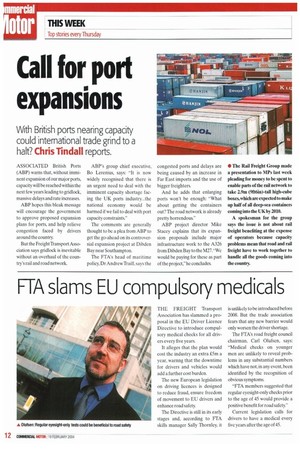Call for port expansions
Page 12

If you've noticed an error in this article please click here to report it so we can fix it.
With British ports nearing capacity could international trade grind to a halt? Chris Tindall reports.
ASSOCIATED British Ports (ABP) warns that, without imminent expansion of our major ports, capacity will be reached within the next few years leading to gridlock, massive delays and rate increases.
ABP hopes this bleak message will encourage the government to approve proposed expansion plans for ports, and help relieve congestion faced by drivers around the country.
But the Freight Transport Association says gridlock is inevitable without an overhaul of the country's rail and road network. ABP's group chief executive, Bo Lerenius, says: "It is now widely recognised that there is an urgent need to deal with the imminent capacity shortage facing the UK ports industry...the national economy would be harmed if we fail to deal with port capacity constraints."
The comments are generally thought to he a plea from ABP to get the go-ahead on its controversial expansion project at Dibden Bay near Southampton.
The FTA's head of maritime policy, Dr Andrew Trail!. says the congested ports and delays are being caused by an increase in Far East imports and the use of bigger freighters.
And he adds that enlarging ports won't be enough: "What about getting the containers out? The road network is already pretty horrendous."
ABP project director Mike Stacey explains that its expansion proposals include major infrastructure work to the A326 from Dibden Bay to the M27. "We would be paying for these as part of the project," he concludes. • The Rail Freight Group made a presentation to MPs last week pleading for money to be spent to enable parts of the rail network to take 2.9m (9ft6in)-tall high-cube boxes, which are expected to make up half of all deep-sea containers coming into the UK by 2010.
A spokesman for the group says the issue is not about rail freight benefiting at the expense of operators because capacity problems mean that road and rail freight have to work together to handle all the goods coming into the country.






































































































































































































